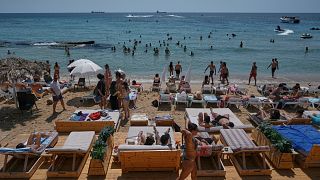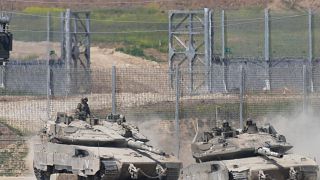Lebanon
Residents and business owners in the Lebanese city of Nabatiyeh cleared debris and started rebuilding their businesses as they returned to the city on Saturday after a ceasefire between Hezbollah and Israel was agreed upon.
Jabal Nasr, the owner of a coffee shop, and his staff began the clean-up process early in the morning.
“We must rebuild, we must stand up again, we must all help each other in Nabatiyeh and in the entire south," he said.
Nasr, like thousands of Lebanese, was returning to check on their properties after the U.S.-mediated ceasefire between Israel and Hezbollah went into effect early Wednesday.
Intense Israeli airstrikes over the past two months leveled entire neighborhoods in eastern and southern Lebanon, as well as the southern suburbs of Beirut, which are predominantly Shiite areas of Lebanon where Hezbollah has a strong base of support. Nearly 1.2 million people have been displaced.
Fishermen hope for lasting ceasefire
The ceasefire brought hope for normality back to many in southern Lebanon on Friday, including fishermen who have long launched their single-engine wooden boats into the Mediterranean at dawn.
During the last two months of its year fighting Hezbollah, Israel imposed a siege on southern Lebanon that kept hundreds of fishers at this ancient Phoenician port on shore, upending their lives and the industry.
While less important than destruction and displacement, the port siege cut many people off from the key ingredients for traditional Lebanese dishes like sayadiyeh — fish and rice boiled in fish sauce — or fried and grilled fish eaten with dips such as hummus and tabbouleh or fattoush salads.
The loss of fish damaged a deep association with home, but now the possibility of renewed Lebanese fishing on the country's southern coast is helping fuel hope for a brighter future.
On Friday, a few boats went out close to the shore as fishers in the port worked on the nets of small boats painted white, blue or red.
Hussein Sukmani, 55, said Friday that he was considering going to sea in coming days but was waiting to see how things unfold.
He hasn't dared set sail since the Israel-Hezbollah war dramatically intensified on Sept. 23. “They were days of fear and horror,” he said. "They were the most difficult days of our lives.”
A week ago, a drone strike killed two young fishers in the city as they prepared their nets on the coast, and some fishermen said Friday that the Lebanese army told them that they if headed out it would be at their own risk .
Among those who sailed near the coast on Friday was Walid Darwish, who returned to the port with two plastic boxes filled with mullet.
“Today is the first time that we sail,” Darwish said, adding that fishers had missed the prime season in October and November.













01:09
Israel bombs Houthi targets in Yemen, rebels respond with missile attack
01:00
Hamas gives 'positive' response to 60-day ceasefire proposal but says talks needed on implementation
01:55
US contractors say colleagues fired live ammunition at Palestinians seeking food
01:30
Foreign Ministers of Oman and Egypt urge Washington and Tehran to resume negotiations
01:04
Israeli airstrike on popular Gaza City beach café kills at least 30
01:30
Trump calls for a Gaza ceasefire deal as some Palestinians are skeptical